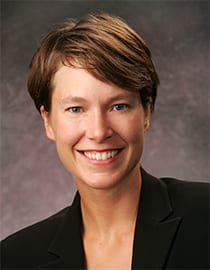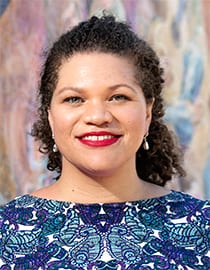By Andrew Cohen
Students routinely ask faculty members Molly Van Houweling and Savala Nolan ’11 about all kinds of courses. But over the past year, those with a substantial focus on race and law seem increasingly coveted.

“Student interest in this topic certainly isn’t new, just as its importance to every field of law isn’t new,” says Van Houweling, Berkeley Law’s associate dean of J.D. curriculum and teaching. “But our current students have been particularly engaged in discussions about how to innovate and improve our offerings.”
Noting that many students conveyed the importance of confronting issues of race and law early in their law school experience, she adds, “One innovation that I’m particularly excited about is our new Introduction to Critical Race Theory for 1Ls class planned for Spring 2022.”
This semester, a whopping 17 offerings are available that count toward the school’s race and law certificate. They include six standard classes, five clinics, five seminars, and a practicum. You can see the entire list here.
“The most effective social justice advocates of the future will be the ones who can bring some sophistication and fluency to issues of race,” says Nolan, the executive director of Berkeley Law’s Thelton E. Henderson Center for Social Justice. “Race is inextricably linked to every social justice issue we face. A lawyer who isn’t conversant on race — its ontology, uses, and impacts — simply won’t be as powerful a force for long-term, system-changing progress.”
In addition to helping students navigate Berkeley Law’s rich curriculum to focus on classes that tackle issues of race and law, the certificate signals to potential employers a commitment to this course of study. While it integrates and amplifies activities that were already happening at the school, Van Houweling says the certificate has provided additional motivation to strengthen the curricular options.
“For example, we’ve committed to offering one of the two core certificate classes at least every year,” she explains. “And we’ve also recently done more outreach to faculty to ensure that we’re identifying classes, like Family Law, which have a substantial focus on race or racial inequality that may not be obvious from the title.”

In addition to numerous courses taught by prolific and influential race scholars, Berkeley Law offers a wealth of clinical program opportunities to address racial injustice. The school also helps students find field placements and other experiential education and pro bono opportunities in which they can study and practice at the intersection of law and racial justice.
“Race is not always at the center of everything we do, but everything we do takes race into account,” Nolan says of the Henderson Center’s programming. “Every lecture, symposium, event, article, and podcast asks participants to consider how racial hierarchy is manifesting itself in the room, in the conversation, and whether we can find and push for racial equity in the midst of whatever else we may be focused on.”
A robust reach
The school began offering race and law certificate courses in fall 2018, and this year’s graduating class was the first eligible to receive it. The certificate has a course, experiential education, writing, and program activity requirement.
Here are a half-dozen of this semester’s race and law courses:
Advanced Civil Rights, taught by Professor john a. powell, will explore civil rights jurisprudence for change and stability, probing issues and novel questions of statutory and constitutional interpretation. Students will probe longstanding questions of racial and economic segregation, the government’s role in creating and remedying these patterns, and recent issues such as the War on Drugs and rise of mass incarceration since the 1970s, hate speech, immigrant detention, and executive power relating to immigration and travel.
Students in Professor David Oppenheimer’s Comparative Equality Practicum Seminar will conduct legal research and advocacy work on equality law cases and policy papers. Students collaborate with public interest firms and NGOs worldwide. Past projects have included a policy paper on discrimination against Muslim women and girls in Europe, an initiative to reform sexual harassment laws across Africa, and an employment discrimination case involving disability rights for communities of women of color (aiming to help them be treated equally in STEM positions).
In Environmental Justice: Race, Class, and the Environment, lecturers Ingrid Brostrom and Mad Stano will examine the intersection of environmental law and civil rights and how decision-making affects both our lived and natural environment. The course presents traditional and emerging topics in environmental justice (a social and political movement seeking greater equity in how environmental harms and benefits are distributed in society), in particular the disproportionate impact of pollution on low-income communities of color.
Family Law, taught by Professor Khiara M. Bridges, will delve into changes that have happened in the legal and popular definition of the family over the years through questions about the ways in which America’s legal system has regulated the family and intimate life. Covering basic family law issues such as marriage, divorce, parenthood, child custody, and non-traditional families, the course will also assess how gender, class, sexuality, gender identity, and race played into constructing a normative ideal of intimate life.
Immigration Law, with Professor Leti Volpp, will survey the legal, historical, and political considerations that shape United States immigration law. The course will review the constitutional basis for regulating U.S. immigration; constitutional rights of noncitizens; history of U.S. immigration law and policy; immigration bureaucracy; admission, deportation, and exclusion; refugee and asylum law; administrative and judicial review; undocumented immigration; immigration and national security; and citizenship and naturalization.
Social Justice Issues in Entertainment and Media Law, taught by Professor Russell Robinson, will explore various social justice issues in the entertainment, media, and technology industries, including the#MeToo and #OscarsSoWhite movements. Students will learn about broader issues of structural underrepresentation and discrimination against women, people of color, LGBTQ people, and other marginalized groups in Hollywood, and how new technologies may perpetuate or disrupt discrimination. There will also be guest speakers from impacted industries.
From Nolan’s view, “It’s crucial that we at Berkeley Law, the best public law school in the country, make every effort to educate our students about race and racial hierarchy, and how both interact with the law.”